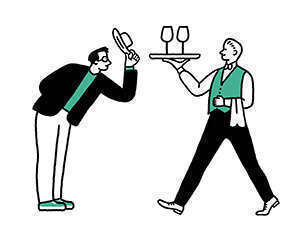If you rent a car, don’t pay for the insurance. It’s a scam.”
These are the parting words of advice that Janet offers to Michael near the end of the series finale of NBC’s sitcom The Good Place. Both characters are permanent denizens of the afterlife, and Michael is heading off to Earth so he can live for the first time as an actual human being.
Janet’s singular trait is near-total omniscience, and of all the fragments of vital information she knew that would be of value to a real person, the most vital had to do with . . . car-rental insurance?
I’ll allow it.
Don’t buy the insurance, and, I might add, don’t ever pay for the add-on warranty coverage when you buy electronics or appliances. Occasionally it’ll be worth it, but in the long run you’ll come out ahead if you bank the money instead.
Janet’s dictum should be on my list, one I’ve been writing ever since my editor at Notre Dame asked me if I’d like to follow up on the scrap of an idea he’d written on a sticky note and affixed to his computer monitor: “What should everybody know?”
The U.S. presidents in order? The formula for a right triangle? The distance between wall studs? The boiling temperature of water? The years each world war ended? How to treat wine stains?
Once it was important to have such information stored in memory for rapid recall. But now that most of us carry devices in our pockets or have digital assistants on our kitchen counters that give us instant access to the world’s storehouse of essential data, history, household hints and trivia, the indispensable has largely become dispensable.
Now, true enough, you shouldn’t have to look up everything every time — you’ve gotta know the alphabet, the days of the week, the months, the year. You need to know how to add, subtract, multiply and divide. Even if you don’t drive, you need to know stop from go and walk from don’t walk.
My first stab at generating a “What should everyone know?” list began with a litany of such grade-school basics, but faltered once I tried to move it into more esoteric or specialized realms.
Should everyone know that Shakespeare wrote Hamlet and that the character serves as a metaphor for indecision? That the four-note signature dun-dun-dun-DUN! is from Beethoven’s Fifth Symphony? Or that Jackie Robinson broke the color barrier in baseball?
In my milieu, sure. You also have to know what “milieu” means in my milieu. But that reflects my experiences and my cultural biases as a white, college-educated, American boomer with an office job. Plenty of people in the United States, not to mention the world, get along just fine without making or understanding conversational allusions to the melancholy Dane and thinking Beethoven is just the name of the Saint Bernard in that ’90s movie of the same name.
We all need to know many things to thrive in our vocational and social lives, of course, but there’s very little anymore that everyone needs to know.
We’re in the Alexian Era — as in, “Alexa, who wrote Hamlet?” — and common knowledge is a pre-Alexian artifact, like proper spelling and long division.
Now the coin of the realm is wisdom — that ineffable blend of fact, experience and insight that our digital assistants can’t (yet) produce. The vital question is no longer “What should everyone know?” but “What should everyone understand?”
That if you rent a car, don’t pay for the insurance, it’s a scam, is a good example. This nugget isn’t in the dictionary or almanac. It’s something that life teaches us, and it deserves a spot on the complete list of pragmatic exhortations Janet would have made to Michael if she’d had the time. I’ve decided to call my list “37 Things Everyone Should Understand.”
The wise person understands that:
If you don’t put in your order, you won’t get served. Don’t sit around waiting for others to offer you what you want in life. That promotion, that date, that raise, that honor? Work hard for it, but let your wishes be known to those who can fulfill them. I heard Associated Press sportswriter Larry Lage offer this pearl to high school students in 2017, but he said it wasn’t original with him. I tracked it back to Michigan-based business owner Charlie McLravy, who remembered it as a version of the charge he used to give to sales personnel in his employ: “You’ve got to make it happen!” Emphasis on the “you.”
Store brand is just as good as national brands when it comes to baking supplies, spices, seasonings, oils, condiments, canned and frozen vegetables, foil, diapers, sliced cheese, pretzels, paper products, orange juice and many cookies and crackers. Your testable default assumption should be that the store brand — some call them “generics” — are indistinguishable from the costlier varieties with which they share shelf space. Few will ever disappoint you.
You must never pass up a chance to make water. An academic historian of my acquaintance attributes this elegant formulation of a familiar parental directive to Edward Everett, the 19th-century U.S. statesman and orator best known for delivering the lengthy speech that immediately preceded President Abraham Lincoln’s pithy Gettsyburg Address. It’s far more memorable and polite than, “Don’t wait until you have to pee to start looking for a bathroom,” but just as vital.
“Should” is conversational poison. You should never tell someone what they “should” do — see what I did there? — because it’s bossy, presumptuous and rude. “Could” is a far better way to offer a helpful suggestion. This bit of wisdom is something you might want strongly to consider, but of course it’s up to you.
When a car is stuck in snow or mud, you take air out of the tires until the sidewalls begin to bulge. This maximizes the area of contact and increases traction.
Paying off your credit cards in full each month is one sure way to beat the system. Or at least not lose to the system.
It’s best to smile when you answer the phone. People can hear it in your voice.

The truest measure of a person’s character is how he treats those to whom he doesn’t have to give respect. Restaurant servers, for example. Housekeepers. Store clerks. Underlings. I once paraphrased this often-heard wheeze in a column and noted it was “an old saying.” Several years later I was delighted to see it attributed to me in a book of uplifting quotations.
It’s good that not everyone shares your tastes in music, sports, literature, food and fashion. Be glad, not disgusted or baffled. You’d never get tickets to anything or reservations anywhere if everyone was just like you.
It’s 10 times easier to fall in love than to stay in love. The longer you live the more preposterous you will find it that we use the same word, “love,” to describe the exhilarating wildfire of new romance and the steady flame of a successful long-term relationship. Passion, obsession and infatuation can lead to love and are important early building blocks, but they ain’t love.
How you spend your time reveals your values. You can bleat all you want about who and what is important to you, but the clock and the calendar do not lie.
If you’re in a conversation and you’re not asking questions, then it’s not a conversation, it’s a monologue. Dale Carnegie’s formulation of this credo was, “To be interesting, be interested.”
You will seldom go wrong if you behave in public as though your children or your parents are watching you. Would they be proud of you? If not, perhaps a course correction or attitude adjustment is in order.
The old-fashioned concept of a “good name” is the most valuable thing you can have. You build it by being a person of your word, by being kind, fair and generous and by having principles and sticking to them. Simple, really, but more difficult than it sounds.
NyQuil won’t shorten your cold, but it will make it infinitely more bearable. Zinc gluconate lozenges, in contrast, when taken at the first sign of a sore throat, will shorten your cold.
You never, ever, ever buy anything or donate money based on a telephone solicitation. No limited-time offer ever truly expires. No urgent fundraising appeal can’t wait a few days. Respect the weakness of the impulsive nooks of your mind. Practice saying, “I’m sorry, I don’t do this kind of business on the phone, but you’re free to mail me your information.”
It’s always better to be overdressed than underdressed. When in doubt, step it up. You can always shed a jacket or tie, pocket the excess jewelry or otherwise affect a more casual look.
The strong stroke on a bathroom or kitchen plunger should be the up stroke. Most clogs are fairly near the opening, so pulling them up first is preferable to jamming them down further.
Unless you’re a collector, no wristwatch is worth more than $100. Even the cheapest department store chronometer tells excellent time these days. Fancy watches are like real diamonds — no one but you can tell the difference. Expensive sunglasses, soaps, cosmetics and many wines often don’t deliver the value you might hope for.
Expensive sheets, pillows and socks are usually worth the money. You are further advised to invest in quality shower heads and tools.
Promptness shows respect. When you’re late, the message you send to the other person is that you don’t value their time. Don’t, then, expect them to value yours.
Saying “I don’t know” is often the best way to sound smart.
Fear of failure leads to mediocrity. If you’re not failing from time to time, you’re not pushing yourself. And if you’re not pushing yourself, you’re coasting.

Keeping perspective is the greatest key to happiness. From the distance of time, even a bumpy road looks smooth.
The easiest way to teach kids to learn to ride a bike is to take the pedals off. Then make sure the seat is set low enough that they can reach the ground with both feet. They’ll learn balance by using the bike like a scooter, and the rest is easy.
Most “talent” is simply the fruit of hard work. Sure, there are geniuses, prodigies and freaks of nature out there making us all look bad, but, for the most part, people are really good at what they do because they’ve worked really hard at it.
Candor is overrated. It’s hard to unsay what you’ve said in anger and almost impossible to take back what you’ve written now that nearly everything is archived online nearly forever. When you’re tempted to vent, remember historian Will Durant’s famous line: “Nothing is often a good thing to do and always a clever thing to say.”
To see your way through interpersonal conflict, think long term. What does “winning” look like for you? Work toward that, but keep in mind that it might be best to settle for a draw.
You will save yourself a lot of time and grief if you maintain a handy list of basic service providers. That list ought to include a trusted plumber, electrician, locksmith, appliance repair specialist and heating/air conditioning contractor. As with the restroom, don’t wait until you really need one to start looking.
The best place to stash handy lists is in “the cloud,” where you can access it from anywhere at any time. Google Docs works for me.
If you can’t be truthful, be quiet. Lies are hard to keep track of.
Self-confidence is extremely attractive. This is particularly true for people on the dating market.
Anyone who treats you badly isn’t worth your time.
You can’t help how you feel, but you can help how you act.

Your habits can make or break you. Every action is a brick, meaning what you do on a daily basis determines the house you end up with. You are the house you build.
It helps your outlook to think about what you “get” to do rather than what you “have” to do. Many things we think of as obligations, requirements and duties are, when properly considered, opportunities, privileges and blessings. I don’t “have” to go to work or to class or to a breakfast social gathering on Monday morning, I “get” to. Life has allowed me the good health and good luck to be allowed to do what many, many others cannot. I savor it.
Silk house plants are the way to go.
Eric Zorn is a columnist for the Chicago Tribune.
